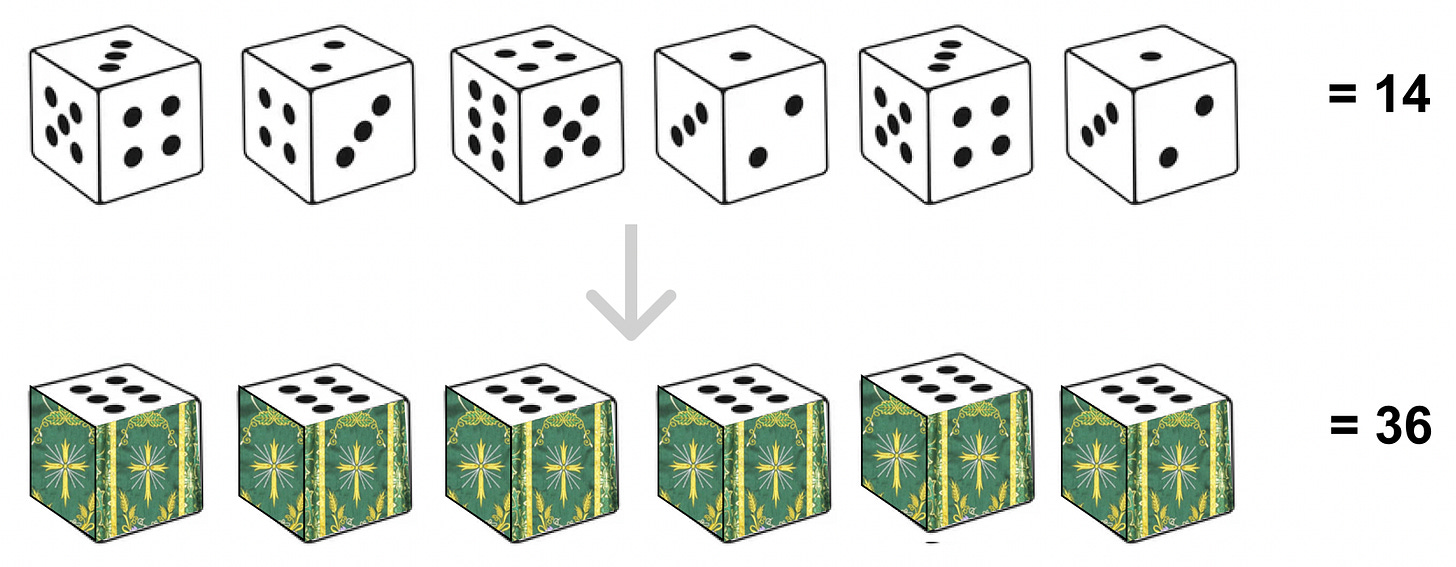I have a theory about how Redemption works, in the Christian sense.
Our lives are a series of actions.
We can picture our actions as dice — lower numbers are worse actions, and high numbers are better ones.
An action is like a dice, in that:
it’s a finite object, but
you can look at it from many different angles.
When we look back on our “life story,” we’re really looking at the sum of our interpretations of our actions — what our actions ultimately mean to us about ourselves. The story they tell us about who we are.
If we believe we’ve done all bad things, we look at all the 1’s facing up and say
“Oy, I did many bad things, I failed to contribute anything good, and my life was meaningless.”
Without redemption, a life of bad actions literally doesn’t add up to much.
I’d guess most people feel more moderately:
“I’ve done some good things, and some bad things, and my life has been kind of meaningful — but not profoundly so.”
The effect of Redemption
When we are Redeemed, God does something specific.
He doesn’t let us go back in time and change what we literally did.
He doesn’t swap out old dice (actions) for new ones.
Instead, he takes those same actions and rotates them — he alters their meaning, so that they add up to the most that they possibly could.
Without changing what we literally did in the past — our life story ends up meaning what it would if we had done the absolute most we could possibly have done, all along.
God wraps our lives in a new frame. When we look back at our redeemed life through God’s eyes, we see “what could have been,” made manifest in what already is.
Personal experience
If you’ve read my spiritual life story, you know my life has been punctuated by profound regret.
Little by little, God is showing me that such regret isn’t necessary, or even accurate — He makes my life such that I don’t need to worry about what could have been. The meaning God gives my life now, makes my past regrets meaningful instead of wasteful.
I’m not saying there’s no need to repent and grieve over our sins — quite the opposite.
But if meanwhile we let God show us their redeemed meaning, perhaps that holy grief need not lapse into human despair.
I’m far from perfect here — to form this theory, I’m extrapolating from brief glimpses at my new Redeemed story. It seems to reveal itself in proportion to my trust in God. Right now, my life story appears to me sort of like this:
Let God do it
Our actions are infinity-sided dice.
We can’t possibly discern all the possible meanings of all our past actions, and then arrange them into a better story without either deceiving ourselves, or aiming too low.
Only God has the wisdom to reinterpret your life for you properly, so don’t try to homebrew this. Let him do it for you.







There's some good wisdom there, and I agree with most of your points. Everyone should reflect on their life, the things they've done and didn't do, and judge themselves as they would judge their own child: with concern, with criticisms, and most of all with love and without an expectation of perfection.
I personally don't believe you need God to do that. I am an atheist, and I am able to look at my past failures without mourning a life wasted. I can see value in my life even if I didn't roll all 6's.
Where I disagree is that I don't need to have my life reinterpreted as a perfect Yahtzee to keep going. Maybe that's not what you meant to say here with your metaphor, but just to play with it a bit, I'd say the problem isn't that we look at our actions and see a bad score - it's that we treat our life as if the point is to get a winning roll. The problem isn't the score, but the scorecard mentality.
I know, you're just playing with a metaphor, and I don't think your vision doesn't extend beyond it. I just wanted to play back. Thanks for this piece!
We're listless, promiscuous,
And life to us is either hit or miss, oh yeah.
- Bad Religion, Part IV (The Index Fossil)